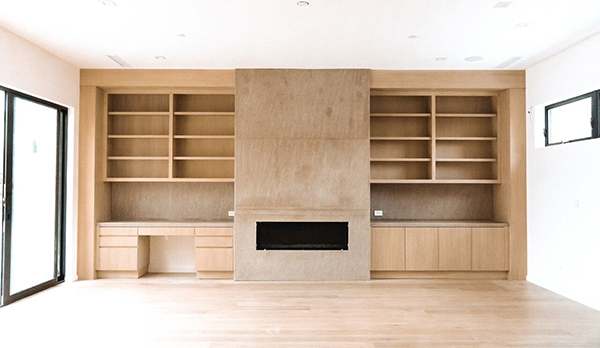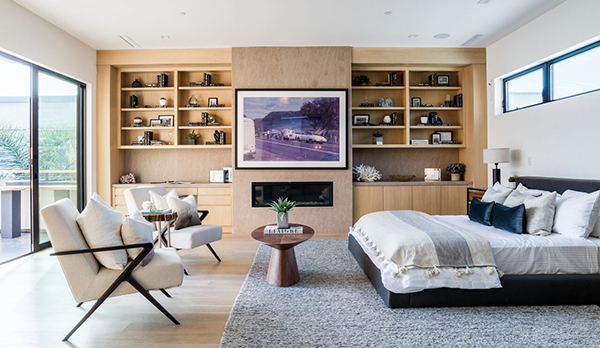Just six days after taking on a Crestwood Hills listing, Nancy Osborne and Tami Pardee put it into contract for just under its $2.8 million asking price.
The three-bedroom, 2,850-square-foot Brentwood property, boasting lush landscaping and canyon views, had languished on the market for 18 months before the duo from Halton Pardee + Partners got on board. The difference, the brokers insist, was the decor.
“The staging really needs to be kind of eclectic and cool, not like the old staging when you used to go into the model homes,” said Pardee, who had also staged her own home before selling it. At the Crestwood Hills listing, she brought in new furniture from staging firm Meredith Baer Home to replace the previous collection.
In the theater of home selling, staging is taking on a more prominent role, as brokers and sellers wake up to the premium a well-staged home can add to a property. A 2015 survey from the National Association of Realtors found that staged homes spent, on average, 73 percent less time on the market. Only 4 percent of respondents said that staging had no effect on the sale of a property, and about a third of buyers’ agents said that staging increased the value of the home by 1 to 5 percent.
“I often refer to it as the jewelry on a model — it elevates the look of an offering,” said Billy Rose, co-founder of brokerage The Agency.
Startups have sprouted up to cater to the growing interest in home staging. Earlier this month, Beverly Grove-based Vesta Home, which has worked on homes ranging from $500,000 to $125 million, set up shop at the House on Sunset at 9169 W. Sunset Blvd. in a Paul R. Williams-designed building that has hosted events for the likes of Universal Pictures, which promoted its “Fifty Shades” franchise there. Through the summer, Vesta is hosting private events for clients who will be able to shop the furnishings and staging service.
“Most of the time when you stage a home it’s difficult to have a series of events at the property due to access and ownership, said Brett Baer, who worked for his aunt at Meredith Baer Home before founding Vesta. The startup, he added, “sees The House on Sunset as an environment that we can build experiences around that will reach beyond the real estate community to share our design with the Hollywood industry.”
Vesta has grown to 160 employees from just 20 last year, according to Baer, and typically uses its swanky furniture for just two to three showings before selling it off.
“We have an extremely high sell-through rate,” Baer said. Vesta will often discard the furniture after five uses, though it once sold some furniture to LeBron James after he purchased a staged home in Brentwood.

Before Vesta staging at 1354 Appleton Way in Venice (Vesta Home)

After Vesta staging at 1354 Appleton Way in Venice (Vesta Home)
Keeping tabs
While staging can sometimes be an effective upselling tool, it’s an up-front payment that can swallow up a significant chunk of a broker’s marketing budget. But price is often negotiable, and different parties may end up footing the bill.
A 1,500-square-foot, single-family home can cost anywhere from $6,000 to $8,000 to stage, Pardee said. A 10,000-square-foot home, however, can reach upwards of $30,000. Vesta did not disclose its rates.
“Historically, 99 percent of home staging customers have been agents, brokers and developers,” Baer said. “However, we’ve been surprised at the level of interest from homeowners.”
What goes into staging varies dramatically. It could be as simple as adding lighting to something more dramatic as repainting the walls. In one case, Aggie Kiss of Modiano Design had to request a permit from the city when staging a condo. Because “delivery is more difficult” and condos take a lot longer, Kiss typically has the city place a “Temporary No Parking” sign where the unloading will take place.
Kiss has worked on everything from single-family homes and condos to commercial properties, as well as at festivals such as celebrity-friendly Coachella, where the hangars at Palm Springs’ airport become event spaces. She’s even staged homes featured on nationwide interior design shows, where other “certain people,” she added, get all the credit.
“My personal favorite style would be modern contemporary, but I can totally do a fixer-upper style,” she said. “Joanna Gaines has nothing on me.”
Staging a master bedroom and one bathroom can run about $3,000, Kiss said. A patio, plus a room, can bring that up to $3,500. That might include removing all existing furniture and replacing it with new pieces, painting the walls, adding accent pieces to the room and even adding artwork.
Agents will sometimes commit to paying for the staging and use that as leverage to get the listing. “It’s coming off of their commission,” Kiss said, “but in the end it’s better for them.”
Often, sellers will pay for the full cost of the three- or four-month home staging contract, even if a home gets sold within a day.
“I’ve seen it where the homeowner may advance it, and the agent may participate in it in some way out of commission,” Rose said. “I’ve also seen it where agents have not taken listings [because] the owner doesn’t want to pay for it.”
Jonathan London, a Compass agent, said he’s never listed a home that hasn’t been staged.
Even if the owners don’t want to paint the house “flat white” — a must in his eyes — he’ll often spend a couple of hundred dollars out of his own pocket to upgrade every single light bulb in the house.
“It’s like night and day,” London said.
In addition to showing off a home, staging is sometimes used to hide its more unsavory bits.
Staging “can also be helpful in distracting buyers from things they may have been focusing” on, Rose said. “Often, a buyer will get confused as to what it is they’re buying — they get caught up, make a deal, close and then come with their keys in hand and they feel like it has a completely different feeling. They got caught up in what was staged.”
